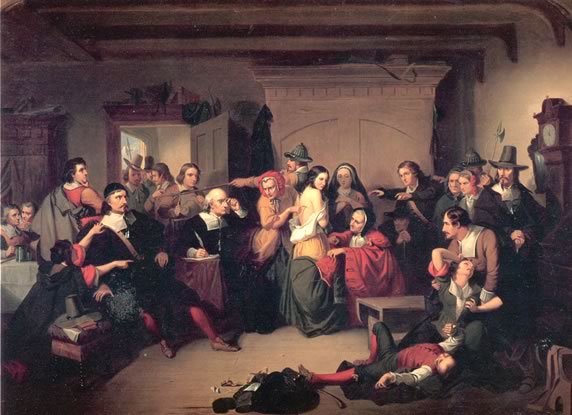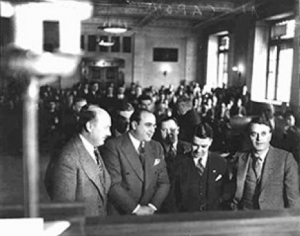Why would adults in Salem, Massachusetts in the 1690s take the accusations of nine year old girls seriously? During the seventeenth century, New England had grown diverse. The people living in the communities were of different backgrounds. But in the 1690’s there was an apparent outbreak of witchcraft. The most famous of these outbreaks was the event in Salem, Massachusetts in 1692 that stirred up the Salem community and soon spread to other communities.
The widespread hysteria over witches was all over the town after an accusation of witchcraft was made in January 1692. A group of young adolescent girls met in the home of Samuel Parris, a Puritan pastor in Salem. The pastor had a nine year old daughter, Betty. Betty and her cousin Abigail were fascinated by the voodoo tales and tricks told to them by the family slave. The family slave, Tituba, was the one whom the little girls had sought after for entertainment.1 It was not long after their time spent with Tituba, when the girls began to behave strangely; seeing visions, babbling at times, and lapsing into trances. The Puritans thought that these behaviors were of witchcraft, as the work of the devil. People in Salem began believing the girls, and charged Tituba and two other village women for practicing witchcraft on them. Two men, John Hathorne and Johnathan Corwin of Massachusetts, were called to do a legal examination of the women. The Puritans followed the Old Testament law. This was how they assessed the examinations. Scripture had a statement that said witches were not able to live. The two men knew exactly what they had to do. The examination was done on these women of Salem by looking for a certain mark on the body: a wart or tit. This specific mark was said to be the place where the devil and his demons would take blood out of the witch.2 Many of the women accused were of lower status in the community.

Research shows most of the accused witches were middle-aged women, widowed, with few or no children. Also, if the woman had been involved with domestic conflicts, they were accused. The women were accused of crimes and appeared to be dangerous by their neighbors. Women in Salem who inherited or possessed land were also accused of witchcraft.3 The accusations towards these women were out of the ordinary and seemingly wrong. One must first think about the view of women during this time. They were undermined and portrayed as having no power or knowledge of such things; they were subservient to the men in the community. Not only were low class women accused of witchcraft, but as time passed, superior women were accused as well.4
On October 29th, the Salem Witch Trials were called to an end. Governor Phips dismissed the Court and that marked the end to the witch hunt craze. Many were disappointed about the ending of the trials, but many were glad to return to work.5 The community in Salem blamed Pastor Parris for letting the innocent die. The people of the Salem church also voted to void his salary. In the following years, those family members of the deceased were restored their good names. The families were awarded a compensation for all the financial loses they went through during such tragic times. Increase Mather, a pastor of the Boston Puritan Church, wanted the people to do away with the court because he believed they put innocent people to death.
The Witch trials took on an important role in American History. The trials became a tragic and memorable moment in history. Generational, racial, and sexual hostility, opposition to law, social stresses, and food poisoning were all causes as to why the people had anxieties that found release in the witch hunt craze. The witch hunts became searches for scapegoats; the community leaders were looking for anyway possible to ease the community’s anxieties.6
- Kenneth P. Minkema, “In the Devil’s Snare: The Salem Witchcraft Crisis of 1692,” The Christian Century, no. 8 (2003): 37. ↵
- Salem Press Encyclopedia, January 2015, s.v. “Salem Witchcraft Trials,” by Warren M. Billings and Kimberly Manning. ↵
- Alan Brinkley, American History, 15th ed., vol. 1: to 1865 (2 Penn Plaza, New York, NY 10121: McGraw Hill Education, 2015), 86-87. ↵
- Salem Press Encyclopedia, January 2015 s.v. “Salem Witchcraft Trials,” by Warren M. Billings, Kimberly Manning. ↵
- Salem Press Encyclopedia, January 2015 s.v. “Salem Witchcraft Trials,” by Warren M. Billings, Kimberly Manning. ↵
- Salem Press Encyclopedia, January 2015 s.v. “Salem Witchcraft Trials,” by Warren M. Billings and Kimberly Manning. ↵



178 comments
Jocelyn Moreno
The Salem Witch Trials are very interesting. The way they came up with the idea is so absurd! People used this event as a way to get rid of people they did not like. I could not imagine living during this time period. This was one of the craziest events in our history. I wish you gave a bit more details about Tituba and the girls but other than that it was a well-written article!
Indhira Mata
During this time it was as if you had to watch and rethink before saying or doing anything because if one bad move happened it could have meant death. The Salem trials were a time when someone disliked another, a simple accusations would lead to death for them because of the created fear. The article touched based on an important topic of how it was the women being accused. The article let it believe that since women had no power and as witches could over throw men.
Sienna Guerra
The Salem Witch Trials are an interesting because each case the women were accused of being witches is in different. Being accused of being a witch because of how they were perceived or the way that acted. I never really understood also why the cases lasted so long but delays such as these happened today so I was as surprised.
Damian Jennings
The Salem Witch Trials are quiet interesting to listen and read about, to accuse only women of being witches is bizarre and hard to wrap my mind around, men were never persecuted or accused of being witches. I am surprised feminist do not use this prime example of persecution in their arguments. Great read and great content.
Belene Cuellar
I have read and seen many issues about the Salem witch trials and none of them ever ended well. All of these women were wrongly accused and killed off. Men and the community accused those who either insulted them or low income people which is just cruel. I am glad that these trials came to an end and that the families of those accused where reimbursed for their suffering.
Lamont Traylor
I have personally read about a bunch of different stories and accounts of what happened back in the days of the Salem witch trials where doing anything that seemed the least bit strange could get a woman hanged. I’ve always thought it was terrible that they sentenced so many women to death for doing what they called witchcraft. Many of those were probably not doing anything.
Jose Fernandez
Every time I read about how people used to believe in witches it blows my mind. It is sad that educated people actually believed that some women had powers and that it was a reason to execute them. I think this reflects how small-minded people used to be. I learned a lot by reading this article; it is an interesting topic and it is very well researched.
Emily Jensen
The Salem Witch Trials are always interesting to learn about because every “case” is unique. Several women were accused of being witches just because they looked the wrong way at their neighbors, or any other trivial event that the accuser could think. I have always found it intriguing that the trials went on for as long as they did without someone dismissing the Court like Governor Phips did. What a bizarre point in our history.
Jocelyn Moreno
I love the amount of detail you put into your article! It was very informative. I feel like the Salem Witch Trials was just an excuse for people to get rid of people they did like and to keep only the “higher class”. It’s odd that the girls begun to act strangely but the way the people blamed it on the slave so quickly is weird as well. This article really had me engaged throughout the whole thing.
Marina Castro
The Catholic church and people in general during the middle ages had a very archaic point of view when it came to science. No one was able to had a different opinion, let alone contradict the church. People, especially women, suffered the consequences of ignorance. So many lives were lost because women were different, or smart. Thankfully, these times are gone and now at days people are able to express themselves without being burned alive.